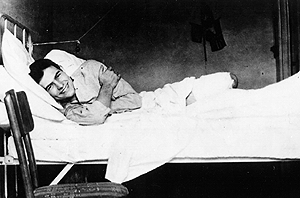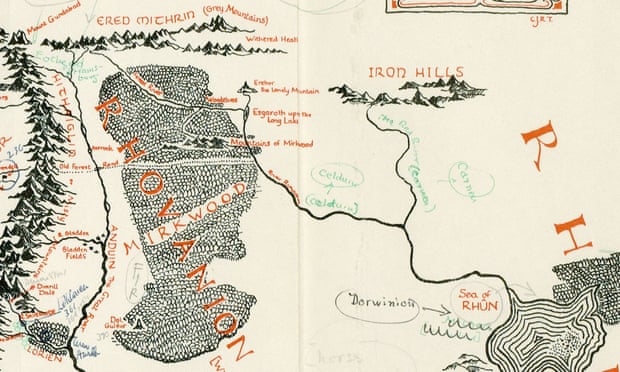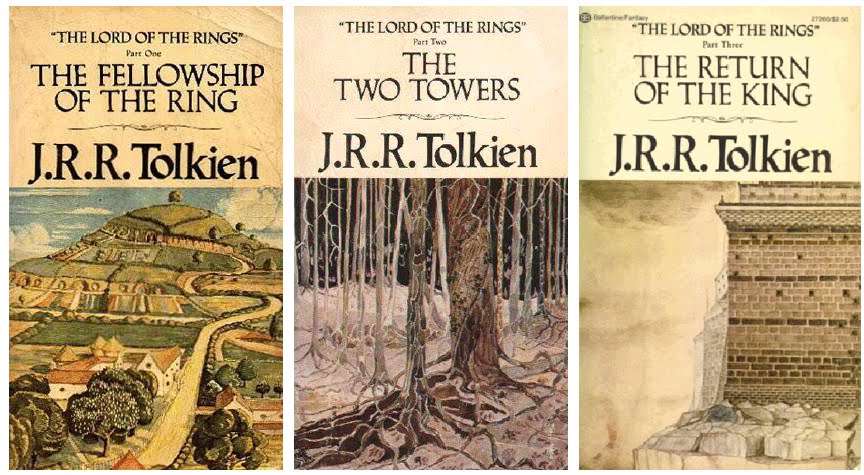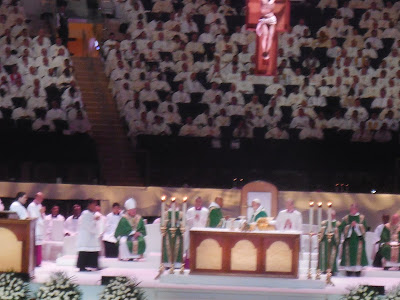This
is a really fine little story, and amazingly you can actually find it on the
internet, here. It’s less than eight pages long, so it’s a
quick read, and if you like what I say about it you can read it in fifteen to
twenty minutes. The story also has a
Wikipedia entry,
but I’m going to give it a lot more depth.
The
story is told in first person through a character only identified as Signor
Tenente, which in Italian translates, “Mr. Lieutenant” or perhaps “Sir Lieutenant.” There are two characters in the story, both
laying at night in a tent—which may be a hospital tent, it’s not clear—awake
listening to the artillery fire in the distant.
It’s during World War I on the Italian front. This is one of Hemingway’s Nick Adams stories, a
group of stories around the character Nick Adams, who in many respects is an
alter ego of the author. Signor Tenente
is Nick Adams. Given this comes from a
story sequence, we know more about the character from the other stories than is
told in this story.
Let
me fill in that backstory. Just as
Hemingway in his real life, Nick Adams joins the Italian Army to fight in
WWI. This was before the United States
entered the war and was the only way Hemingway (and presumptuously Nick) could
join the fight. Hemingway and Nick are both
seriously injured in the war, both physically and emotionally traumatized, and
spend time recuperating in hospitals.
This life experience is also fictionalized in Hemingway’s novel, The Sun Also Rises. The scene in the “Now I Lay Me” short story
is where Nick, post injury, is recuperating.
It is night and he is afraid to go to sleep because he fears “his soul
leaving his body.” He had the sensation
of just that when he was injured, and now because of his emotional trauma he
senses his soul leaving permanently if he lets it.
The
story is divided into two parts. The
first part is a mostly expository section where Signor Tenente trying to stay
awake at night describes the various mental exercises he performs to keep
himself from dozing off. The second part
is a dialogue with the man in a bed beside him, John, who also cannot fall
asleep. John also is an American, but an
Italian immigrant to Chicago. He too
joined the Italian Army to fight in the war.
It should also be noted that the title, “Now I Lay Me,” comes from the
children’s bedtime prayer, “Now I Lay Me Down to Sleep”:
Now I lay me down to
sleep,
I pray the Lord my soul to keep,
If I shall die when I'm wake
I pray the Lord my soul to take,
Amen.
Here’s
the opening paragraph, setting up the situation.
That night we lay on the
floor in the room and I listened to the silkworms eating. The silkworms fed in
racks of mulberry leaves and all night you could hear them eating and a dropping
sound in the leaves. I myself did not want to sleep because I had been living
for a long time with the knowledge that if I ever shut my eyes in the dark and
let myself go, my soul would go out of my body. I had been that way for a long
time, ever since I had been blown up at night and felt it go out of me and go off
and then come back. I tried never to think about it, but it had started to go
since, in the nights, just at the moment of going off to sleep, and I could
only stop it by a very great effort. So while now I am fairly sure that it would
not really have gone out, yet then, that summer, I was unwilling to make the
experiment.
Hemingway
doesn’t mention the artillery fire in the distant here, but the sound of the
silkworms eating—what I imagine to be a very subtle and delicate
sound—contrasts with the cannon fire.
Then Signor Tenente tells the reader the various ways he tries to keep
awake. First he tells us about how he
tries to remember every stream and even every locale on the streams where he
fished.
I had different ways of
occupying myself while I lay awake. I would think of a trout stream I had
fished along when I was a boy and fish its whole length very carefully in my
mind, fishing very carefully under all the logs, all the turns of the bank, the
deep holes and the clear shallow stretches, sometimes catching trout and
sometimes losing them. I would stop fishing at noon to eat my lunch, sometimes
on a log over the stream, sometimes on a high bank under a tree, and I always
ate my lunch very slowly and watched the stream below me in the back yard while
I ate. Often I ran out of bait because I would take only ten worms with me in a
tobacco tin when I started. When I had used them all I had to find more worms,
and sometimes it was very difficult digging in the bank of the stream where the
cedar trees kept out the sun and there was no grass but only the bare moist
earth and often I could find no worms. Always, though, I found some kind of
bait, but one time in the swamp I could find no bait at all and had to cut up
one of the trout I had caught and use him for bait.
Sometimes I found insects
in the swamp meadows, in the grass or under ferns, and used them. There were
beetles and insects with legs like grass stems, and grubs in old rotten logs, white
grubs with brown pinching heads that would not stay on the hook and emptied
into nothing in the cold water, and wood ticks under logs where sometimes I
found angleworms that slipped into the ground as soon as the log was raised.
Once I used a salamander from under an old log.
The salamander was very small and neat and agile and a lovely color. He
had tiny feet that tried to hold on to the hook, and after that one time I
never used a salamander, although I found them very often. Nor did I use
crickets, because of the way they acted about the hook.
Sometimes the stream ran
through an open meadow, and in the dry grass I would catch grasshoppers and use
them for bait and sometimes I would catch grasshoppers and toss them into the
stream and watch them float along, swimming on the stream and circling on the
surface as the current took them, and then disappear as a trout rose. Sometimes
I would fish four or five different streams in the night, starting as near as I
could get to their source and fishing them downstream. When I had finished too
quickly and the time did not go, I would fish the stream over again, starting
where it emptied into the lake and fishing back upstream, trying for all the trout
I had missed coming down. Some nights, too, I made up streams, and some of them
were very exciting, and it was like being awake and dreaming. Some of those
streams I still remember and think that I have fished in them, and they are
confused with streams I really know. I gave them all names and went to them on
the train and sometimes walked for miles to get to them.
That
is some of the most beautiful writing you will ever read in prose. That’s Hemingway the prose master at his
best. Notice too how the salamander
faces a similar trauma as the character thinking about him, a crippling wound. After the fishing memories, we hear how Signor
Tenente keeps awake praying for every single person he has ever known.
But some nights I could
not fish, and on those nights I was cold-awake and said my prayers over and
over and tried to pray for all the people I had ever known. That took up a
great amount of time, for if you try to remember all the people you have ever
known, going back to the earliest thing you remember—which was, with me, the
attic of the house where I was born and my mother and father's wedding cake in
a tin box hanging from one of the rafters, and, in the attic, jars of snakes
and other specimens that my father had collected as a boy and preserved in alcohol,
the alcohol sunken in the jars so the backs of some of the snakes and specimens
were exposed and had turned white—if you thought back that far, you remembered
a great many people. If you prayed for all of them, saying a Hail Mary and an Our
Father for each one, it took a long time and finally it would be light, and
then you could go to sleep, if you were in a place where you could sleep in the
daylight.
On those nights I tried
to remember everything that had ever happened to me, starting with just before
I went to the war and remembering back from one thing to another. I found I could
only remember back to that attic in my grandfather's house. Then I would start
there and remember this way again, until I reached the war.
That
image of the parent’s wedding cake will have significance later in the story,
and those images of preserved animals will also come to be symbolic. I’ll get to that later when I pull the story
elements into a coherent theme, but I’m touched in that passage on how he prays
a Hail Mary and an Our Father for every person he can remember. It’s not commonly known, but Ernest Hemingway
converted to Roman Catholicism as a young man.
One catches glimpses of it in his fiction here and there, especially in
his earlier work such as this. I doubt
he was all that religious later on; he was divorced three times at a time when
even unreligious Catholics did not divorce at all.
From
remembering the wedding cake in the attic, Signor Tenente’s memory jumps to an
incident where his mother cleans out the basement and in an effort to dispose
of what she thinks is useless stuff, burns to ashes her husband’s collectables.
About the new house I
remembered how my mother was always cleaning things out and making a good
clearance. One time when my father was away on a hunting trip she made a good thorough
cleaning-out in the basement and burned everything that should not have been
there. When my father came home and got
down from his buggy and hitched the horse, the fire was still burning in the
road beside the house. I went out to meet him. He handed me his shotgun and looked
at the fire. "What's this?" he asked.
"I've been cleaning
out the basement, dear," my mother said from the porch. She was standing
there smiling, to meet him. My father looked at the fire and kicked at
something. Then he leaned over and picked something out of the ashes. "Get
a rake, Nick," he said to me. I went to the basement and brought a rake
and my father raked very carefully in the ashes. He raked out stone axes and
stone skinning knives and tools for making arrowheads and pieces of pottery and
many arrow-heads. They had all been blackened and chipped by the fire. My
father raked them all out very carefully and spread them on the grass by the
road. His shotgun in its leather case and his game-bags were on the grass where
he had left them when he stepped down from the buggy.
"Take the gun and
the bags in the house, Nick, and bring me a paper," he said. My mother had
gone inside the house. I took the shotgun, which was heavy to carry and banged against
my legs, and the two game-bags and started toward the house. "Take them
one at a time," my father said. "Don't try and carry too much at
once." I put down the game-bags and took in the shotgun and brought out a
newspaper from the pile in my father's office. My father spread all the blackened,
chipped stone implements on the paper and then wrapped them up. The best arrowheads
went all to pieces," he said. He walked into the house with the paper
package and I stayed outside on the grass with the two game-bags. After a while
I took them in. In remembering that, there were only two people, so I would
pray for them both.
Finally
the man sleeping in the next bed beside Signor Tenente starts up a
conversation. The gist of the ensuing
dialogue is about family and money and especially marriage. John insists that Signor Tenente get married
and have a family. Signor Tenente is
ambivalent on the surface, but underneath we suspect that his trauma has caused
him to be repelled by the thought of emotional engagement that marriage
requires. After all, the very memory of
his parents was that of a marital disconnect that ruined his father’s precious personal
items.
So
what is this all about? How do the
fishing, the prayers, the burning of his father’s items, and the discussion of
family, money, and marriage hold together?
The
key here is the setting of the injured man laying down praying while dreaming
of fishing bya stream. This creates an
allusion to the Fisher King myth, a meme in western culture that originates in
the early tales of the Arthurian legend. From Wikipedia:
In Arthurian legend the
Fisher King, or the Wounded King, is the last in a long line charged with
keeping the Holy Grail. Versions of his story vary widely, but he is always
wounded in the legs or groin and incapable of moving on his own. In the Fisher
King legends, he becomes impotent and unable to perform his task himself, and
he also becomes unable to father or support a next generation to carry on after
his death. His kingdom suffers as he does, his impotence affecting the
fertility of the land and reducing it to a barren wasteland. All he is able to
do is fish in the river near his castle, Corbenic, and wait for someone who
might be able to heal him.
Hemingway
was greatly influenced by T.S. Eliot’s poem The Waste Land,
which at its core has the Fisher King despondent over the cultural and
spiritual wasteland of post WWI western culture. Hemingway used the Fisher King allusion as
derived from Eliot’s poem to great effect in several of his early works, especially
his great novel, The Sun Also Rises. In “Now I Lay Me” we see Signor Tenente as
the embodiment of the Fisher King unable to connect emotionally because of his
wound. The sound of the artillery fire
in the background recalls the physical trauma of his injury while the contrasting
sound of the silk worms gnaws at his psyche and soul. Signor Tenente lays impotent, struggling to
keep his soul from leaving. The wound is
great. Signor Tenente is still in the
hospital months later. Though he prays,
his memory drifts to petrified objects, his parent’s wedding cake and jars of
animals in alcohol. The memory of his
parents is not even a happy memory. It
is the memory of a marital blunder and phallic objects (axes, knives, and Indian
arrows) reduced to ashes. It is a memory
of a moment gone awry.
John
tells Signor Tenente the means to healing the wound, fertility: marriage and
children. But Signor Tenente very means
to psychic recovery has been compromised.
He is wounded in the legs and groin; he is left impotent. He now is the petrified animal. The story is of the struggle for Signor
Tenente to heal from his trauma.



























